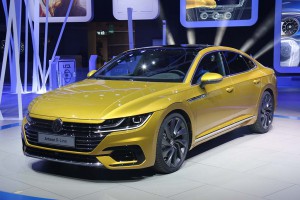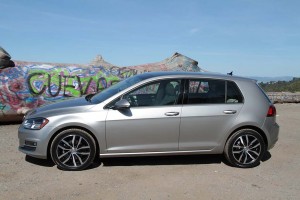Volkswagen is expected to plead guilty in U.S. District Court in Detroit today, wrapping up a settlement with the federal government for cheating on diesel emissions tests.
The move follows a series of civil settlements, and will cost the automaker $4.3 billion, the figure announced in January at a news conference by government regulators just days before the end of the Obama Administration. Seven current and former Volkswagen employees have faced criminal charges for their role in the diesel rigging, though one has already pleads guilty. Only one of the others is currently in custody.
All told, the German automaker has so far agreed to spend more than $20 billion in civil and criminal fines and other costs. It is currently ramping up the buyback of around 475,000 2.0-liter diesels equipped with so-called a “defeat device” meant to reduce emissions during emissions testing. A separate deal covers more than 40,000 vehicles with 3.0-liter turbodiesels, though VW believes it can repair some of those.
(VW to now offer two Tiguan models in the U.S. Click Here to learn why.)
If, as expected, the criminal settlement is accepted by U.S. District Judge Sean Cox, it would be the largest such deal ever involving an auto manufacturer. A number of other automakers and auto suppliers have been hit with criminal sanctions in recent years, however, including General Motors, Toyota and airbag maker Takata.
The federal criminal settlement is expected to be the last major legal action VW faces in the United States, though it must yet negotiate an agreement – or face trial – covering investors who claim that by concealing the rigging of its diesels, VW cost them billions of dollars when its stock price crashed.
The rigging was first made public in September 2015 when the U.S. Environmental Protection Agency announced its findings about the illegal software on VW’s smaller diesel engine. It subsequently also accused the maker of rigging the bigger engine. Those two engines were used not only on models sold with Volkswagen nameplates, but also by the Audi and Porsche brands.
The software was designed to detect when a vehicle was undergoing emissions tests and reduce the level of key pollutants, such as smog-causing oxides of nitrogen. In real-world situations, however, the engines could produce up to 40 times more of the gases.
(After legal dispute, Uber’s autonomous cars returning to California. Click Here for the latest.)
Initially, VW tried to blame the rigging on a “handful” of low-level engineers who couldn’t figure out any other way to meet the company’s goal of producing clean, quick and fuel-efficient diesels. But at a news conference in January, government prosecutors noted that managers much higher up the corporate ladder were aware of the rigging.
One engineer had already pleaded guilty. Other indictments have followed, and on January 24, Oliver Schmidt, a 48-year-old manager accused of helping develop and conceal the so-called “defeat device,” pled not guilty in Detroit federal court. He was arrested while passing through Miami shortly before the corporate criminal settlement was announced.
The Justice Department has warned it may yet bring other indictments. Meanwhile, criminal investigations are underway in several other countries, notably including Germany. There, former VW CEO Martin Winterkorn, who resigned shortly after the diesel rigging was revealed, has been under close scrutiny by prosecutors in the city of Braunschweig. No charges have been announced, however.
There has been some opposition to the criminal settlement, critics arguing, among other things, that VW should be made to pay more to owners of its rigged diesels.
But, in a court filing, the government and automaker jointly declared that, “two class-action settlements were reached that provide more than full restitution to all current and former owners.” Noting that 99% of those who had sued VW “accepted that settlement, (it reflects) their almost-unanimous agreement that the settlement provides for fair restitution.”
(Trump Admin. may soon roll back tough EPA fuel economy rules. Click Here for the story.)


